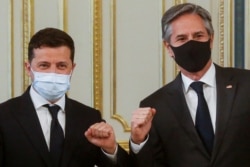U.S. President Joe Biden spoke by phone Thursday with his Russian counterpart as the American leader sought a diplomatic solution to escalating tension along Russia's border with Ukraine.
"We are prepared for diplomacy and for a diplomatic path forward," an administration official told reporters Wednesday. "But we are also prepared to respond if Russia advances with a further invasion of Ukraine."
The call, requested by Russian President Vladimir Putin, came ahead of highly anticipated high-level talks in Geneva on January 10. Neither president is expected to participate in those talks, the official said.
White House officials said Thursday's call began at 3:35 p.m. EST and concluded 50 minutes later, after midnight in Moscow.
This was the second call this month between the two men. In the earlier call, they spoke about what were then 70,000 troops gathered on the Russian side of the border, according to intelligence estimates from satellite images. But U.S. intelligence analysts predict that Putin plans to mass as many as 175,000 troops.
Former U.S. Ambassador to Russia Michael McFaul spoke with VOA and had this to say: "Biden is right to accept Putin's request for a phone call. If Putin made the request, he must have a message to convey. But Biden also must convey his own messages.
“First, Biden should make clear that serious negotiations about European security must include a much wider agenda than Putin proposed, including Russian threats to security such as the annexation of Crimea, the recognition of South Ossetia and Abkhazia, and Russian forces occupying Ukraine, Georgia, and Moldova.
“Second, Biden should make clear to Putin that any discussion of Ukrainian security and sovereignty must have Ukrainians at the table. Maybe Europe needs a Helsinki 2.0. But Europe does not need a Yalta 2.0."
The U.S. repeatedly has assured Ukraine of its support, and provided tens of millions of dollars in security assistance. On Wednesday, Secretary of State Antony Blinken spoke to Ukrainian President Volodymyr Zelenskiy.
In a statement, Blinken said he "reiterated the United States' unwavering support for Ukraine's independence, sovereignty and territorial integrity in the face of Russia's military buildup on Ukraine's borders."
The White House has said, repeatedly, that there will be "significant consequences" if Russia invades. Those include harsh economic sanctions and increased security support for Ukraine.
On Wednesday, Zelenskiy tweeted: "I was assured of full [U.S.] support for [Ukraine] in countering Russian aggression." He used flag emojis to indicate the countries.
Blinken also spoke with the foreign ministers of Britain, France and Germany on "coordination to deter any further Russian aggression against Ukraine," State Department spokesman Ned Price said.
The Western foreign ministers "affirmed the consensus among allies and partners to impose massive consequences and severe costs on Russia for such actions," Price said in a statement.
On Wednesday, Russian Prime Minister Mikhail Mishustin called the heads of state in key neighbors Armenia, Azerbaijan and Belarus.
A spokesperson from the National Security Council told VOA the U.S. is relying on its alliances in the region to reach a diplomatic solution.
"We are unified as an alliance on the consequences Russia would face if it moves on Ukraine," said the spokesperson, who asked to speak on background when discussing current U.S. policy. "But we are also unified in our willingness to engage in principled diplomacy with Russia. … We will adhere to the principle of 'nothing about our allies and partners without our allies and partners, including Ukraine.' "
Administration officials have declined to respond publicly to Moscow's demands, which include that NATO deny membership to Ukraine and that the security alliance reduces its deployments in Central and Eastern Europe.
On Wednesday, the senior administration official said: "Our view is that we can make most progress, actually, at the negotiating table sitting across from one another behind closed doors and in close consultation with our allies and partners. So we don't have any current plans to go publish a document or a draft agreement the way that the Russian side has done."
Meanwhile, some analysts say they doubt Putin's moves will actually culminate in an invasion. National University of Kyiv professor Taras Kuzio is one of several analysts who believes that an actual invasion would be costly, lengthy and bloody – and therefore, unlikely.
"If Putin attempts to crush Ukraine with overwhelming military force, he could end up losing the country forever, while also sparking anti-government unrest inside Russia with the potential to threaten the survival of his entire regime," he wrote. "For a man who has already lived through the collapse of one empire, this might be a risk he is not prepared to take."
VOA's Myroslava Gongadze contributed to this report.





